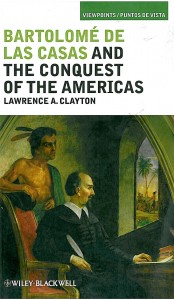TUSCALOOSA, Ala. — Among the figures who participated in and later wrote about the Spanish Conquest of the New World, one stands out as a passionate and sometimes abrasive champion of the native population – Bartolomé de las Casas.
This priest, historian, writer and activist stands as the passionate focus of the scholarship of Dr. Lawrence Clayton, University of Alabama professor of history, and forms the subject of a book that offers insight into the conquest.

“Bartolomé was like a prophet out of the Old Testament,” said Clayton, author of “Bartolomé de las Casas and the Conquest of the Americas,” published recently by Wiley-Blackwell. “What do prophets do? They preach the truth. He fits that prophetic role. Nobody liked this guy, because he was constantly harping at people and telling them that they were wrong. He could be vindictive. He didn’t turn the other cheek.”
Clayton’s book, intended for upper-level high school and college students, offers insight into the 16th century – the era of exploration and colonization of the Americas by the Spanish – and Las Casas’ substantial role in chronicling and critiquing the conquest.
Las Casas (1485-1566), a priest and later a Dominican friar, watched first-hand the conquest and came to sympathize closely with the Indians whom Spanish conquistadors and settlers subjected or even enslaved.
Before taking final vows, Las Casas traveled to the Spanish colonies in 1502, and he first watched the conquest from the standpoint of a merchant.
“He came over (to the West Indies) to take advantage of the opportunities along with other entrepreneurial Spaniards in the islands of the Caribbean,” Clayton said. “He actually held tributary Indians, and he started to make a pretty good income. He also witnessed the brutality of Spanish men of arms, who were extorting labor from the Native American Indians. He witnessed the barbarity first hand. It began to pull him apart.”
Finally, Las Casas witnessed a massacre of Indians on Cuba in 1514, and that event turned him into an activist.
“He goes over the edge – I call it his moment of epiphany,” Clayton said. “He never puts aside his secular side – he’s very much an activist priest. He takes up the defense of the Indians, and he devotes the rest of his life to the juridical and scriptural and moral defense of the Indians.”
After his epiphany, Las Casas wrote hundreds of pages on the Spanish conquest, including a well-regarded chronicle that has the only extant transcription of the log book for Christopher Columbus’ first voyage to the New World. He also returned to the New World four more times to witness the conquest. He also managed to anger whole sectors of Spanish ruling society with his accusations.
“Las Casas was appointed the universal defender of American Indians by the regent in 1516, and he became the point man in the defense of American Indians, much to the chagrin and anger of generations of Spaniards who thought he was betraying them by taking the side of the Indians,” Clayton said.
Las Casas wielded tremendous influence on the politics of Spain in the16th century in opposition to the establishment that was exploiting Native Americans and the conquest. The reason? He had the ear and the conscience of the Spanish king, Charles I, who took the throne in 1518 at the age of 18. Las Casas reminded the king that the conquest could have consequences for Charles’ soul.
“He has this kind of royal protection over him,” Clayton said.“Charles isn’t going to do everything he says, but he understands that salvation is at stake.”
The book is part of a series titled “Viewpoints/Puntos de Vista,” which seeks to offer students perspectives on Latin-American history. The book distills a more than 1,000-page manuscript on Las Casas that Clayton is writing for a longer biography to be published by Cambridge University Press in 2012.
For Clayton, researching Las Casas takes on a spiritual quest. He points out that Las Casas, as a priest and friar, was trying to reconcile the Gospel message of love with the brutal treatment of Native Americans. The spiritual nature of Las Casas’ quest fuel his anger and his activism, a quest that resulted in improvements in the treatment of Native Americans during the conquest.
“Las Casas lived a long life, and he was involved in almost all the important junctures in which the Spanish crown and the Spanish church were dealing with the Spanish conquest,” Clayton said. “He dealt with it in the context of the Christian scriptures. One was violent, and the other taught love, and Las Casas recognized the huge divide between the two.”
The history department is part of UA’s College of Arts and Sciences, the University’s largest division and the largest liberal arts college in the state. Students from the College have won numerous national awards including Rhodes Scholarships, Goldwater Scholarships and memberships on the USA Today Academic All American Team.
Contact
Richard LeComte, media relations, rllecomte@ur.ua.edu, 205/348-3782
Source
Lawrence A. Clayton, lclayton@simplecom.net, 205/348-7100